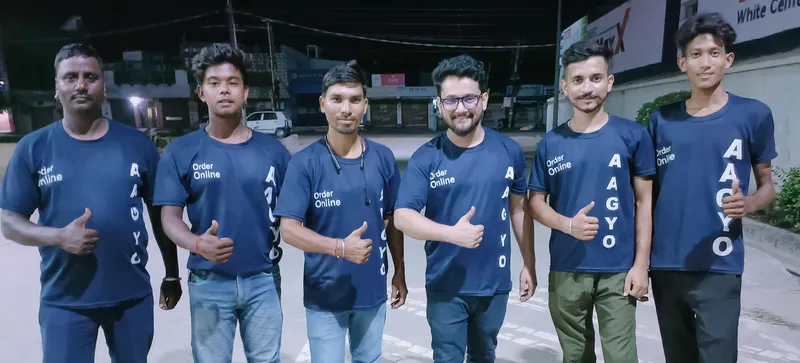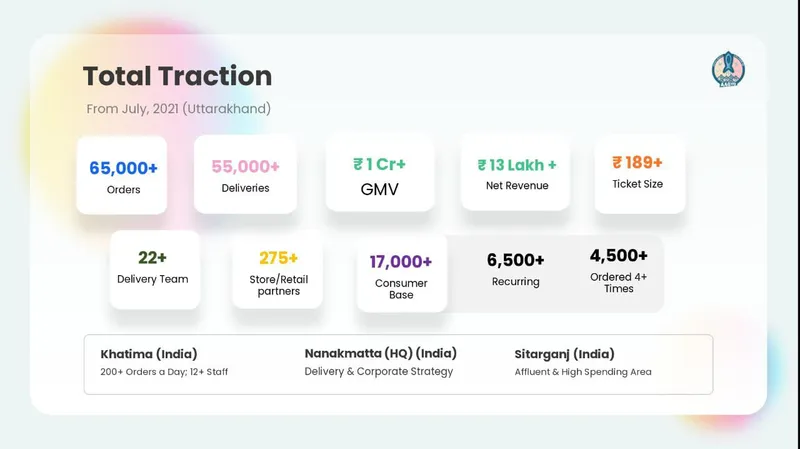Hyperlocal delivery startup focuses on Tier III India and beyond
AAGYO is a hyperlocal delivery app that offers services like ecommerce, grocery, and transport. Currently operational in three small towns in Uttarakhand, it is focusing on Bharat.
Mukul Mehta returned to his home in a small town in Uttarakhand after completing his graduation from Uttarakhand Technical University in September 2017. Keen to help develop the region and aid people, he co-founded Zappier’s Academy, a JEE-NEET coaching institute that offered training at low rates, in Nanakmatta.
However, the 24-year-old soon realised that small towns lagged their bigger counterparts in many ways.
“When I came back to Nanakmatta, there was no aggregator or service provider to help with doorstep delivery. I started researching the area and people's needs (while maintaining Zappier's Academy), and realised that locals wanted these services but had no options,” Mukul says.
“I also saw a lot of manpower migrate to big cities in search of work. Most of them were doing delivery work there. I thought why did they have to leave their family and do work that they could do here?”
A couple of years down the line, COVID-19 brought the world to a standstill. Hundreds of small vendors and store owners were not able to run their business, and Mukul realised the need to launch a hyperlocal delivery startup.
In July 2021, he launched , a delivery app that transports anything - food, vegetables, groceries, apparel, accessories, packaging, and more - to your door in a few minutes.
“I started AAGYO (आगयो meaning arrival in many local languages from different states like Uttarakhand, Uttar Pradesh, Haryana, Rajasthan etc.) in Nanakmatta, a Tier V town, to see the response with only one delivery partner. The response was so great that I had four delivery partners by the end of one month,” Mukul says.
The second month of operations also saw burgeoning interest from neighbouring Tier IV cities, Khatima and Sitarganj, to launch services there as well.
AAGYO did just that, and in 10 months has delivered 55,000+ orders and is readying to touch GMV of over Rs 1 crore.
“We are proud to have a team of over 22 people (mostly delivery partners), who are earning while staying at home. We are very happy to achieve our mission and vision by providing services to Tier II, IV, and V India, stopping migration, generating more employment opportunities, and helping rural economic development,” Mukul says.

Team AAGYO
The founder bootstrapped the delivery startup with an investment of around Rs 12 lakh.
AAGYO, which is recognised by both Startup India and Startup Uttarakhand, is incubated with Runway Incubation, Dehradun. It also received got the Xartup Fellowship (online), which has helped by means of sessions with experts in different areas and technical and marketing credits (AWS, ZOHO, Freshdesk etc).
Focusing on Bharat
AAGYO offers everything a customer in a smaller town needs in one place - whether its food, groceries, medicines, medical items, fruits and vegetables, and more. The hyperlocal marketplace soon plans to add other verticals such as mobile phones, electronics, and fashion.
“In Tier III, IV, and V cities and towns, we are working so consumers enjoy convenience, job seekers can get jobs locally, and local retailers can increase sales from customers they would have normally ignored. It's a small initiative to improve the rural economy and provide basic services to all those who need them,” Mukul says.
The startup will soon launch an Offline Order Management Feature, which will help vendors to maintain offline customers.

AAGYO has generated a revenue of over Rs 13.5 lakh and crossed a GMV of over Rs 1 crore in just 10 months
Explaining, the founder says, “Say the vendor is a restaurant owner registered with AAGYO and has his menus listed on our platform. We plan to allow him to place a QR code on the table (linked to the table number). Customers can then view the vendor's menu directly on the AAGYO app or website and place orders; the vendor's kitchen will be notified directly. Customers do not have to wait for a waiter and the vendor saves money on hiring many waiters.”
The delivery startup also plans to introduce micro-loans for vendors, similar to BharatPe loan options.
“We will offer microcredit to vendors who have been with us for a certain period, based on the orders. This enhances their ability and we can deduct money from their payouts to recover the loan amount,” Mukul says.
AAGYO claims to be working with 275+ vendors to serve 16,500+ customers, numbers that are “increasing day by day”. It has more than 19 delivery partners and makes deliveries between 12 to 45 minutes, depending on the product category.
The startup’s revenue model includes:
- Commissions: Charged on sales made through platform
- Service fees: Delivery charges and convenience fees from consumers
- Advertisements: On app and website
In the last 10 months, the startup claims to have generated a revenue of over Rs 13.5 lakh.
The way ahead
In the next one year, the startup plans to expand to more than six cities, onboard 500+ vendors, and generate 100+ employment opportunities in the states of Uttarakhand and Uttar Pradesh.
“We aim to target smaller areas and provide services similar to big cities. Apart from convenience, we want to generate employment opportunities,” Mukul says.
The founder says in the next five years the startup wants to provide services at least in 1,000+ small cities, “generating a minimum of 5,000+ job opportunities and contributing towards India's development”.
AAGYO is planning to raise funds and is also in talks with a few investors.
Mukul says, “Some of the players who will be our competitors in the future include Zomato, Swiggy, Blinkit, and Zepto in the delivery space; Amazon, Myntra, Flipkart, and Ajio in the ecommerce space; Dunzo, WareIQ, and inthree in hyperlocal; and Mahindra Logistics and Borzo in the logistics sector.”
Edited by Teja Lele









